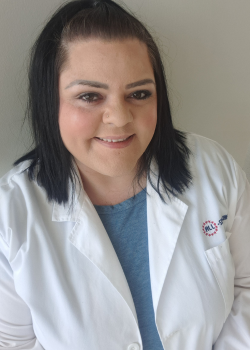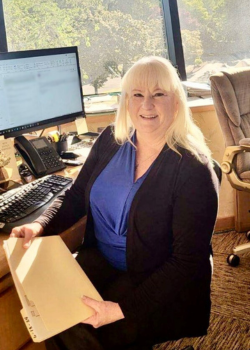More than “just” a dental assistant

Dental assistants don’t always get the recognition they deserve. At times, these professionals may get overlooked or dismissed as “only” dental assistants.
“The biggest misconception I have encountered is that we ‘just suction’ and clean up the aftermath of a procedure,” says Kelly Barker, the Expanded Functions Dental Assisting (EFDA) Program Director at All-State Career School in Baltimore. “That couldn’t be further from the truth!”
In reality, dental assistants are highly valuable, skilled, and educated members of the dental team who play a critical role in the oral health journeys of their patients and the success of their practices.
Jody Gregersen, CDA, a former dental assistant who is now an office manager, agrees that there are some misconceptions about the profession. She adds that some people also underestimate how much knowledge dental assistants possess.
“They have been trained and continue to study and develop their skills throughout their career,” she explains. “[Dental assistants] are the ones who go over planned treatments with patients and give post-treatment instructions. They often take calls and triage to find a solution in a dental emergency. Their dental training and their concern for patients is invaluable.”
From updating patient charts, sterilizing rooms and instruments, and taking x-rays to helping the doctor during the procedure, dental assistants need a lot of knowledge to perform the countless duties they’re responsible for and ensure others can do their jobs effectively.
“As an assistant, I was the first one to arrive to get set up for the day, being a liaison between the front and back office, and the last to leave,” shares Gregersen. “Chairside duties are only a part of the day. Helping other auxiliary staff and the front desk as needed adds to being a valuable part of the entire team.”
“I honestly don’t know how an office could function without us,” says Barker.

“The biggest misconception I have encountered is that we ‘just suction’ and clean up the aftermath of a procedure. That couldn’t be further from the truth!”
— Kelly Barker, EFDA Program Director at All-State Career School
While dental assisting is demanding, it’s more than “just a job.” It’s a highly rewarding career that can open many opportunities for professional and personal growth.
“Once I started as a dental assistant, I instantly said to myself, ‘This is what it feels like to love your job!’” explains Barker. “After the shock wore off, I started saying that out loud to people because I had wasted so much time, so many years not being happy, jumping from job to job, and never realized that there are people who do actually love their career paths.”
Like many dental assistants, Barker’s passion for the profession comes from helping people. Whether it’s witnessing someone’s confidence return after seeing their new smile or making an anxious patient more comfortable in the dental chair, Barker found her calling — and her confidence grew quickly as her experience did.
“As I mastered being able to easily adapt to working with various doctors, I felt a jolt of self-confidence along with the realization that I was keeping up with the seasoned assistants,” she shares. “After I became consciously aware of that, my self-confidence kept rising and I kept challenging myself by assisting various specialists and asking a lot of questions. I wanted to understand every aspect of not just what I was doing, but also what the doctor was doing.”
Today, she’s passing on that passion to new dental assistants. In 2020, Barker accepted a teaching position at her former program. Now, she’s the lead program director. Her accomplishments over the past eight years are a testament to the growth potential in the dental assisting profession.
“I adore my students who have the same unique interest as I do, and I genuinely feel lucky that I have managed to get where I am today,” she explains.
Gregersen took a different path, but dental assisting proved to be just as important to her growth over her four-decade career. After serving in the U.S. Air Force, she became a dental assistant.
Similar to Barker, Gregersen thrived in the role. Not only did her dental assisting skills grow over time, but so did her self-belief.
“I took pride in my hands-on skills: fabricating temporary crowns, amalgam polishing, and placing sealants,” Gregersen says. “But I also became more confident by engaging in conversations and building lasting relationships with coworkers and patients.”
Gregersen spent 20 years as a dental assistant, until an injury sustained during her time in the Air Force prevented her from continuing to work chairside. But her experience led to other opportunities. She worked as a dental insurance supervisor for five years before returning to a practice setting as an office manager.

“Chairside duties are only a part of the day. Helping other auxiliary staff and the front desk as needed adds to being a valuable part of the entire team.”
— Jody Gregersen, CDA
Even with her experience in dentistry, it was a “big task” for Gregersen to manage an office with 20 employees and three dentists. But she viewed it as another opportunity to challenge herself — and she encourages other dental assistants to push their boundaries as well.
“Never stop learning. Never stop growing as a person,” she advises. “If there’s a class that is outside of your comfort zone, some training you can get in the front office, or a chance to expand your skills, seize the moment. When an opportunity arises to learn more about the entire business of dentistry, grab it because you never know what the future holds.”
Barker echoes Gregersen’s sentiment, explaining that dental assisting can open many doors, whether it’s to office management, insurance, education, dental hygiene, or another area.
“You aren’t just stuck doing one thing,” she says. “There are so many options and avenues to explore. You can explore them all if you choose to!”
It’s not easy work, says Barker, but the gratification dental assisting provides makes it all worthwhile.
“Without becoming a dental assistant, I wouldn’t have a fulfilling career,” she shares. “And I wouldn’t have been able to work my way into a position that made me find my second passion, where I wake up every day looking forward to going to work.”

